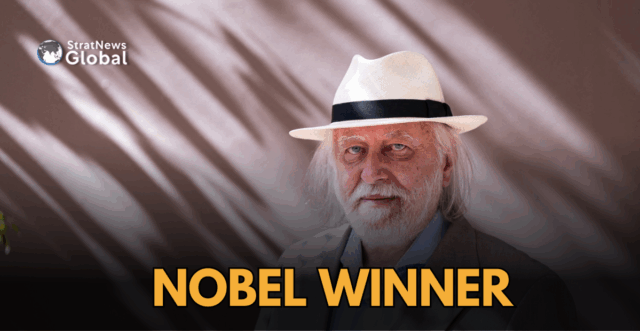Hungarian writer Laszlo Krasznahorkai won the 2025 Nobel Prize in Literature on Thursday, “for his compelling and visionary oeuvre that, in the midst of apocalyptic terror, reaffirms the power of art”.
“Laszlo Krasznahorkai is a great epic writer in the Central European tradition that extends through Kafka to Thomas Bernhard, and is characterised by absurdism and grotesque excess,” the Swedish Academy, which awards the prize, said in a statement.
“But there are more strings to his bow, and he also looks to the East in adopting a more contemplative, finely calibrated tone.”
Asia Travels
The settings of Krasznahorkai’s novels move across central Europe’s remote villages and towns, from Hungary to Germany, before skipping to the Far East, where his travels to China and Japan left deep-seated impressions on Krasznahorkai.
The American critic Susan Sontag crowned Krasznahorkai contemporary literature’s “master of the apocalypse”, the Academy said, “a judgement she arrived at after having read the author’s second book, Melancholy of Resistance”.
About Krasznahorkai
Krasznahorkai is the second Hungarian to win the prize, worth 11 million Swedish crowns ($1.2 million), after Imre Kertész in 2002. The newest Nobel prize winner was born in the small town of Gyula in southeast Hungary, near the Romanian border.
His breakthrough 1985 novel, Satantango, is set in a similarly remote rural area and became a literary sensation in Hungary.
Krasznahorkai also had a close creative partnership with Hungarian filmmaker Bela Tarr. Several of his works have been adapted into films by Tarr, including “Satantango”, which runs to more than seven hours, and “The Werckmeister Harmonies”.
Krasznahorkai’s writing may resonate with readers immersed in news from Russia’s war in Ukraine or the Palestinian-Israeli conflict.
“We seem to have entered the 21st century in a more hostile and bleak environment than we hoped for at the end of the 20th,” said Jason Whittaker, Professor of Communications at the University of Lincoln.
“So actually … some of the bleak and darkly comic elements of books such as Satantango actually will resonate with many more readers than previously.”
(with inputs from Reuters)





